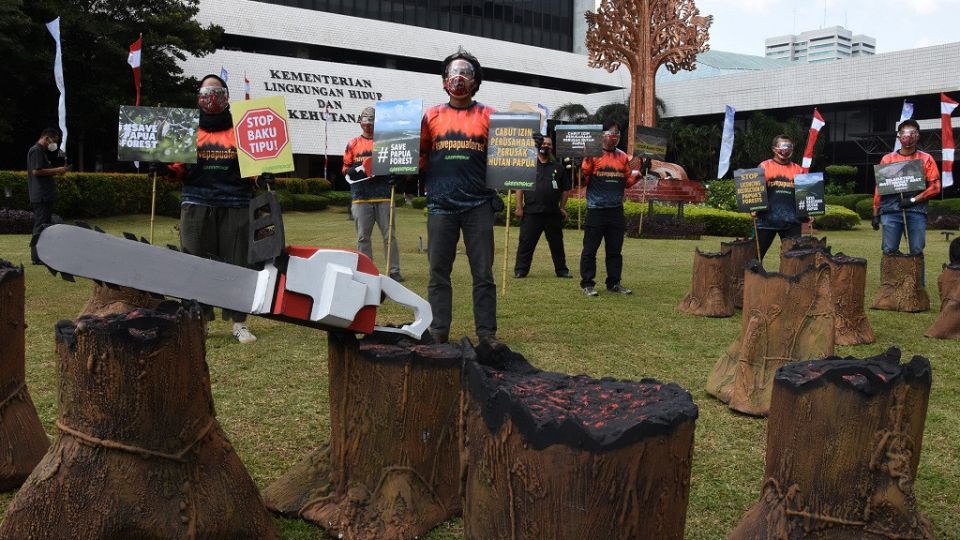September 16, 2022
JAKARTA – A new deal between Indonesia and Norway to combat deforestation does not go far enough, activists say.
The agreement comes a year after Indonesia backed out of the decade-long REDD+ US$1-billion agreement, which was part of a United Nations-backed global initiative criticized for its ineffectiveness.
While few substantive details have been announced, Norway has said it is prepared to grant monetary rewards for Indonesia’s efforts to reduce emissions from deforestation and forest degradation from 2016 onward to support the country’s ambitious goal of becoming a net carbon sink – storing more carbon than it releases into the atmosphere – by 2030.
Activists have bemoaned a lack of ambition on Indonesia’s part.
Greenpeace Indonesia forest campaigner Iqbal Damanik said the “reduce deforestation” terminology used by both parties showed the government’s lack of commitment, as it appeared content with slowing deforestation instead of halting it entirely.
“We have this term, ‘planned deforestation’, which refers to an area of the forest we’re going to lose [over a period of time],” said Iqbal.
Citing the Environment and Forestry Ministry’s official forest and land use (FOLU) net sink 2030 plan, Iqbal said 2.78 million hectares were at high risk of deforestation.
Instead of focusing on the restoration of previously deforested areas, he said, Norway could have pushed Indonesia to intensify efforts to protect what was left of the country’s existing forests.
No matter how big Norway’s contribution was, Iqbal added, the problem would persist as long as planned deforestation continued.
He said Norway’s efforts to help Indonesia meet its emissions goals were to be appreciated, but he cautioned that it remained to be seen whether the additional funding could solve longstanding problems such as planned deforestation and violations of indigenous rights.
Zenzi Suhadi of the Indonesian Forum for Living Environment (WALHI) said that to make a difference, the deal would have to focus on bringing about a moratorium on concession rights, including for palm oil plantations and mining.
Zenzi said the government had to “withdraw forest concession rights given to companies and introduce further moratoriums on palm oil plantations and mining concessions”.
In a study from this year, WALHI found that more than 33 million hectares of forest in the country had been conceded to private industry. Some 4.5 million hectares had been granted mining concessions, while a further 3.2 million hectares in Central Kalimantan, North Sumatra and Papua had been allocated for national food estate projects.
Victory lap
On Monday,Environment and Forestry Minister Siti Nurbaya Bakar and her Norwegian counterpart Espen Barth Eide were joined by Foreign Minister Retno Marsudi in announcing the signing of the agreement.
“[This] represents more than just a partnership. It is not just about the results-based contribution agreement; it encompasses a broader engagement on climate and forest-issues in Indonesia,” said Siti at a joint press conference on Monday.
The minister also cited the government’s success in reducing deforestation to its lowest level in 20 years with a 90 percent decrease in 2019 to 2020 as compared to 2014 to 2015. This, she said, reflected Indonesia’s seriousness about reaching the 2030 FOLU net sink goal.
Espen praised Indonesia’s efforts to combat deforestation, remarking that the country had “made great strides under the leadership of President [Joko “Jokowi” Widodo …], and we see Indonesia as a world leader on the issues that we’re discussing today”.
Espen hoped the details of the contribution agreement would be finalized over the next three to four weeks.
Second bloom
Forestry ministry foreign cooperation bureau head Dida Migfar Ridha said the new agreement would differ from the previous REDD+ scheme.
“The new partnership won’t just revolve around results-based payments. […] There’s going to be a broader engagement here, as the challenge is in how to develop governance in the agenda of climate action,” said Dida.
He claimed Indonesia’s efforts would not hinge on Norway’s contributions and that even before the agreement was signed, the government had been steadily reducing carbon emissions from deforestation and forest degradation.
Dida said he appreciated Norway’s efforts and was optimistic about the ongoing discussions on the contribution agreement, which would include the measurement, reporting and verification (MRV) protocol to be used for the payments.
In a press release on Monday, Norway said it had agreed to pay the $56 million contribution for forest-related emissions reductions for 2016 to 2017. But contributions for results generated from 2020 onward would be based on an updated MRV protocol that the two parties would have to agree upon.
The $56 million contribution was called for under the previous REDD+ agreement, which Indonesia and Norway entered into in 2010.
Citing Norway’s failure to deliver the promised grant money, Indonesia ended the agreement in 2021.
Earlier this week, a study published in the Proceedings of the National Academy of Sciences named Indonesia one of the worst offenders for tropical deforestation caused by large-scale mining operations from 2000 to 2019.
The study found that an expansion of coal mining in Kalimantan was the chief cause of the problem.
From 2000 to 2019, Indonesia lost 190,100 hectares of forest due to mining expansion, with 45 percent of the losses occurring from 2010 to 2014 as the country’s coal production doubled.
Additionally, the study found that mining expansion had driven indirect deforestation in a surrounding 50-kilometer radius and that the total deforested area in the country could be much higher if this secondary loss was taken into account.


